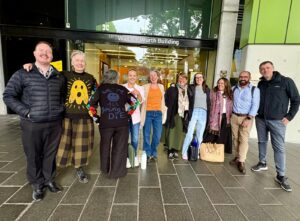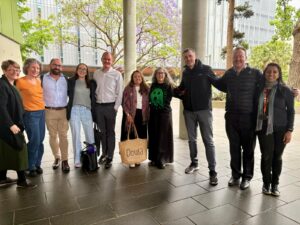News & Resources

Reflections on the UNSW Death Literacy Project
Opening Up Conversations That Matter
By Danni Petkovic.
This week, Dying to Know (Proveda) had the privilege of delivering a powerful pilot session on death literacy to medical students at UNSW, in collaboration with a group of 14 incredible Death Doulas. This session was part of our ongoing commitment to building compassionate communities, improving death literacy across sectors, and strengthening capacity-building within future workforces.
Why This Matters
Death remains one of the least discussed, yet most universal experiences. For many of the students, this was the first time they had engaged with the topic in a meaningful way. The session revealed just how little exposure future doctors have to the realities of dying, especially outside clinical settings. Many were surprised to learn that dying at home is even possible.
The Role of Doulas
The doulas brought warmth, wisdom, and lived experience into the room. Their non-clinical perspectives helped students explore grief, dying, and care in deeply human terms. While some facilitators noted that doulas relied on notes or slides, this was understood as a way to manage nerves and ensure consistency. The feedback was clear: students valued hearing real stories and personal reflections more than theory alone.

Student Reflections
Engagement varied—some students were quiet, others deeply moved. Facilitators observed that silence didn’t mean disengagement. In fact, many students later shared how the session had affected them personally, prompting reflections on their own experiences and future roles as doctors. Cultural factors also played a role, with some students coming from backgrounds where death is rarely discussed or seen as bad luck. Importantly, the session reinforced that all emotions and responses are welcome in conversations about death and grief—whether quiet reflection, curiosity, discomfort, or vulnerability.
What We Learned
The session highlighted the importance of semi-structured storytelling, emotional safety, and peer-led reflection. Students responded best when doulas shared personal experiences and invited discussion. The BBC Human Body – Death video (preview here), while dated, was a powerful tool for exploring end of life care and community support. Many students expressed interest in revisiting this topic later in their studies, when they feel more confident in their clinical roles.
Looking Ahead
There’s strong interest in making this an annual session allowing us to track how death literacy evolves over time and identify where deeper support is needed. As the program grows, we’ll continue refining the format to ensure it meets students where they are, emotionally and professionally.

14 Death Doulas were paired with over 40 teaching Facilitator Doctors, supported by countless UNSW convenors and staff who helped bring this initiative to life. It was a true showcase of powerhouse teamwork. We’re grateful to UNSW, the participating Doulas, and the students who showed up with openness and curiosity. Together, we’re helping shape a future where compassionate care and death literacy are part of every healthcare journey.
Explore More Resources
Videos & Talks:
What Really Matters at the End of Life | BJ Miller | TED
Dr. Lani Leary – No One Has to Die Alone: You Can Make a Difference | TEDX
Trajectory Of Dying Has Changed
Films & Campaigns
thelastecstaticdaysmovie.com
livethelifeyouplease.com
Websites & Tools
waitingroomrevolution
deathliteracy.institute
deathcafe.com
Grief Resource Links
Natural Death Advocacy Network
Shrouded Cremation
Aquamation: Alkaline Hydrolysis
Palliative Care
Death / End of Life Doula / Deathwalker / Death Midwife
Books
Ernest Becker – Denial of Death
The-Worst-is-Over
Being Mortal
Charlie Corke – Letting Go
